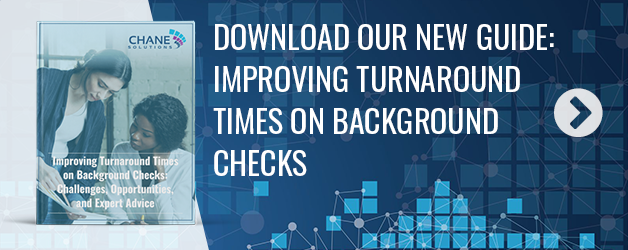We have worked with many new clients who found themselves frustrated with their previous background screening partner. We hear lots of feedback: the turnaround time was too slow, the information was inaccurate, or their prices were too high. But by far, the one we hear the most often is a lot simpler: they were poor communicators.
We have all encountered bad communication habits with business partners, and it’s not any better when you experience it with your background screening partner. It’s disappointing to feel like you can’t talk to a real person, it’s frustrating to get the runaround on solutions to your problems, and it’s annoying when you don’t receive clear timelines and expectations. When this continues, you can feel like every interaction with your vendor will become a whole ordeal.
Not only that, but communication problems also drive delays in your background checks. They are a significant no-no during regular hiring periods. But it’s especially irritating if you’re going through a substantial hiring period, like when opening up a new headquarters or ramping up due to seasonal revenue patterns.
You can expect better—you can demand better—communication from your background check partner. Here are some of the best practices you should require your background check partner to follow.
Best Practices for Communication and Service
The best customer-focused organizations in this industry build their customer service around four core elements:
- They are personal
- They are competent
- They are proactive
- They are convenient
Let’s dig into each of these.
They are personal.
Good customer service is all about a personal touch. After all, it’s one set of humans in the service of another. No matter how busy an organization is, they should prioritize treating their customers like humans who deserve good communication. When they take this personalized approach, they emphasize competence, convenience, and proactiveness.
They are competent.
Across many studies, competency is the factor identified as the element that plays the largest role in stellar customer service. In fact, it’s the root of it all. Often, when a problem occurs, it’s because the issue wasn’t able to be resolved with the first person who saw it. The case goes into limbo at this point, waiting for the right person to work on it.
When you’re not talking to the right person to solve the problem, it can feel like there’s a lack of substantive problem-solving coming back to you.
FCRA certification
In the background screening industry, FCRA certification is king. When front-line employees—who are the first to learn of a problem—are FCRA-certified, it ensures that many issues get resolved by the first person that works on it.
Escalation of issues
Of course, there won’t always be a quick fix. Some problems may require someone else’s expertise. This is where many organizations fail because this escalation step takes too long to occur.
The 1/24 rule
That’s why having a well-defined escalation process is critical to success. Here at Chane Solutions, we follow an internal rule we call the “1/24 rule.”
For issues that aren’t mission-critical, the front-line rep promises an hour to investigate the matter. If there is still no resolution after an hour, the problem gets escalated to someone with specialized expertise, with a 24-hour promise.
It’s simple, yes. But it’s effective. It ensures that reps know how long to work on a problem, how quickly to escalate it, and also sets clear expectations with you, the client.
Speaking of clear expectations:
They are proactive.
Customers want companies to be proactive in reaching out to them. Background screening isn’t necessarily a turnkey industry. You don’t push a button and receive results. Since background screening is inherently a research effort, snags will occur along the way. Some will catch your partners off-guard, but many are foreseeable.
For example, during the COVID-19 pandemic, most counties severely reduced their research capacity. Many counties reduced the number of research clerks, reduced the number of available research terminals, or changed their hours.
Proactive, service-oriented organizations set clear expectations upfront. When they encounter issues, they don’t make like an ostrich and stick their head in the sand: they reach out as soon as the problem occurs, explain it, and set clear timelines for resolution and follow-up.
They are convenient.
Last, but certainly not least, is convenience. You want to get in touch with a customer service representative through whichever channel is the most convenient for you. The best consumer reporting agencies offer support through communication channels their customers rely on most and make it easy for customers to figure out how to contact you.
We go a step further. We work diligently in the early stages of a new relationship to understand our customer needs: that means learning the “how, when, who” of their communication expectations. And early on, we tend to over-communicate to build good habits and find the right balance.
Of course, responsiveness is critical. When you call, does someone pick up? When you email, does someone respond? They should, without exception.
Do you consider your background screening vendor as a strategic partner?
Companies often don’t think about the more unspoken nature of their relationship with their background screening vendor. This relationship should be a partnership, and you should consider them an extension of your HR organization.
The more integrated your provider is into your strategic plans, the better they can enable you to hit your objectives.
Here are some times that you want to clue in your background screening partner as soon as possible:
- When changes are occurring that are going to drive a rapid increase in your headcount
- When you’re about to go on a hiring spree, whether one-time or seasonal
- When you’re about to move to a new area or open a new headquarters
Your partner can help your business planning by being brought in early. Here’s an example.
Most companies are used to background checks being completed in 24-48 hours. You build this into your hiring cycle when opening a new location, giving yourself a few weeks to interview candidates, make offers, and complete their background checks.
You expect this to be fine, but you happen to be opening a new location in Boston. Unfortunately, background checks in Boston can take a long time. We typically plan for 2-3 weeks for the background check alone because the county there is infamously slow. These delays push back your opening, and it catches you completely off-guard.
By bringing your background check partner in early in the planning for that new location, they would make sure you build in plenty of time to complete your background checks in Boston.
The other benefit of treating your provider as a partner is that they can help you save money: you may be requesting multiple types of background checks, but they could be redundant. A state-wide screen may capture the same information that a county search does: by bringing your partner in, they can make sure you’re not paying twice for the same result.
What are some of your biggest customer service annoyances?
If you feel your background checks are taking too long, a knowledgeable, experienced screening firm can help you understand why. At Chane Solutions, we would be happy to discuss turnaround time with you. We often work with our clients to tighten up the background screening process from both ends. Contact us here.
In the meantime, for more tips on achieving faster background checks, access our free guide, “Improving Turnaround Times on Background Checks: Challenges, Opportunities, and Expert Advice.” Click below to download your copy.



Leave a comment